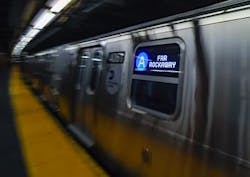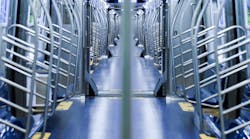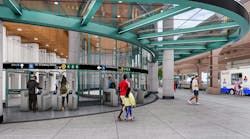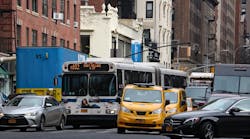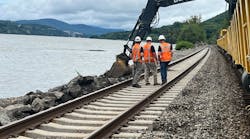MTA projects put on hold due to lawsuits against congestion pricing
The Metropolitan Transportation Authority (MTA) has released a list of projects across the subway system, buses, Metro-North Railroad and the Long Island Rail Road (LIRR) that are at risk due to the lawsuits against congestion pricing. Anticipated congestion pricing bond proceeds of $15 billion make up more than 50 percent of the remaining funds in the MTA’s 2020-2024 Capital Program. As a result, the MTA says the Capital Program must be largely placed on hold, halting advertisement of nearly all new construction contracts and moving forward only with limited, urgent exceptions.
“Congestion pricing is foundational to the MTA Capital Program,” said MTA Construction & Development President Jamie Torres-Springer. “With the lawsuits challenging the program, critical projects to maintain and improve our transit system and more than 20,000 jobs are at risk of delay or disruption.”
MTA explains investments supported by congestion pricing funds are essential in advancing projects that would create a more efficient and sustainable transit system that meets the needs of New Yorkers today and in the future. A sample of affected projects:
Reliability. Congestion pricing revenue will contribute $1 billion to purchase new subway cars, new M9A cars for the LIRR and Metro-North and new locomotives for the LIRR, which would reduce emissions and improve reliability for LIRR, Additionally, vital signal modernization projects on the Fulton Line A C in Brooklyn, N.Y., and 6 Ave. Line B D F M in Manhattan have already been placed on hold. The projects would benefit more than 1.6 million daily riders and include installation of communication-based train control (CBTC) and replacement of 70 switches and 17 interlockings dating back to the 1930s.
Accessibility and station modernization: Since 2020, the MTA is delivering projects to make stations accessible five times faster. However, the pace the MTA is at is at risk, as station accessibility upgrades and station renewals across all five boroughs may be delayed, including:
- The Bronx: Brook Avenue 6, 3 Ave.-138 St. 6, Kingsbridge Road 4, 167 St. D, Wakefield-241 St. 2 5
- Brooklyn: Hoyt-Schermerhorn A C G, Neptune Avenue F, 18 Ave. D, Nostrand Avenue A C, Jefferson Street L
- Manhattan: 145 St. A B C D, 59 St.-Lexington Ave. 4 5 6 N R W, 42 St.-Bryant Park B D F M 7, 7 Ave. B D E, 110 St. 6
- Queens: Briarwood E F, Parsons Boulevard F
- Staten Island: Clifton SIR
In addition, station renewals at 7 Ave. F G, East 149 St. 6, 179 St. F, Briarwood E F, 3 Ave. 138 St. 6, Brook Avenue 6 and upgrades to the public announcement system at more than 70 stations across the lettered lines are at risk.
Equity and sustainability: Funds from congestion pricing would enable purchase of more than 250 new electric buses and 11 bus depots across all five boroughs to operate and maintain electric bus fleets:
- East New York Depot
- Eastchester Depot
- Grand Avenue Depot in Maspeth, Queens
- Gun Hill Depot in Baychester, the Bronx
- Jackie Gleason Depot in Sunset Park, Brooklyn
- Jamaica Depot
- Kingsbridge Depot in Inwood, Manhattan
- Mother Clara Hale Depot in Harlem
- Queens Village Depot
- Ulmer Park Depot in southern Brooklyn
- Yukon Depot in New Springville, Staten Island
The electrification plan prioritizes environmental justice communities so bus depots in historically underserved communities will be the first to replace diesel and hybrid buses with electric. Three depots would also receive critical HVAC repairs.
Future contracts to advance Second Avenue Subway Phase 2 rely on funding from congestion pricing. The project, long overdue for the residents and businesses of transit-dependent East Harlem, will create three brand-new accessible stations at 106 St, 116 St, and 125 St and increase transit connectivity at the 125 St. station, with connections to Metro-North trains and M60 Select Bus Service to LaGuardia Airport.
State of good repair: Without congestion pricing, the MTA runs the risk of falling behind on repair work necessary to update aging infrastructure and assets critical to the reliability of the system. The assets, which MTA notes is often hidden from the public eye, are essential and lack of investment could lead to disruptive outages, including:
- Repairs and overcoating to keep our elevated lines structurally sound
- Substation repairs and renewals to keep power running
- Repairs to emergency exits and fan plants to keep customers safe in an emergency
- Shop and yard repairs across the system are necessary to keep facilities running
- Water remediation at LIRR Atlantic Terminal and rehabilitation of Ronkonkoma’s LIRR parking garage
In addition to Metro-North's state-of-good repair work, efforts to advance West of Hudson investments and electrification of the Hudson Line south of Croton-Harmon are also impacted. The 2020-2024 Capital Program is estimated to support 57,400 jobs – 23,000 of which are at risk, according to the MTA.
